#philistines
Text
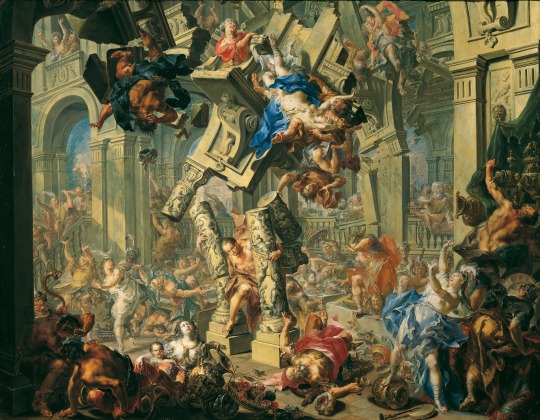
Samson's Revenge by Johann Georg Platzer
#samson#art#johann georg platzer#rococo#israelite#israelites#warrior#biblical#bible#religion#religious#pillars#temple#temple of dagon#architecture#philistine#philistines#christianity#christian
118 notes
·
View notes
Text

samson pulling down the philistine temple of dagon
in the "frauenfelder historienbibel", alsace, 15th c.
source: Frauenfeld, Kantonsbibliothek Thurgau, Y 19, fol. 223v
#15th century#historienbibel#frauenfelder historienbibel#samson#temple of dagon#philistines#christian iconography#medieval art
83 notes
·
View notes
Text
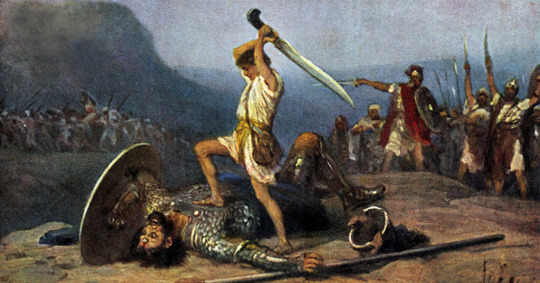
Goliath (/ɡəˈlaɪəθ/ gə-LY-əth)[a] is a Philistine warrior in the Book of Samuel. Descriptions of Goliath's immense stature vary among biblical sources, with the Masoretic Text describing him as 9 feet 9 inches (2.97 m) tall. Goliath issued a challenge to the Israelites, daring them to send forth a champion to engage him in single combat; he was ultimately defeated by the young shepherd David, employing a sling and stone as a weapon. The narrative signified King Saul's unfitness to rule, as Saul himself should have fought for Israel.
Modern scholars believe that the original slayer of Goliath may have been Elhanan, son of Jair, who features in 2 Samuel 21:19, in which Elhanan kills Goliath the Gittite, and that the authors of the Deuteronomic history changed the original text to credit the victory to the more famous character David.
The phrase "David and Goliath" has taken on a more popular meaning denoting an underdog situation, a contest wherein a smaller, weaker opponent faces a much bigger, stronger adversary
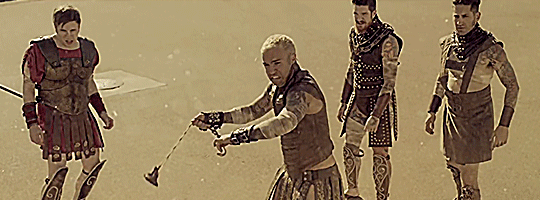
Goliath's name
Tell es-Safi, the biblical Gath and traditional home of Goliath, has been the subject of extensive excavations by Israel's Bar-Ilan University. The archaeologists have established that this was one of the largest of the Philistine cities until destroyed in the ninth century BC, an event from which it never recovered. The Tell es-Safi inscription, a potsherd discovered at the site, and reliably dated to between the tenth to mid-ninth centuries BC, is inscribed with the two names ʾLWT and WLT. While the names are not directly connected with the biblical Goliath (גלית, GLYT), they are etymologically related and demonstrate that the name fits with the context of the late tenth- to early ninth-century BC Philistine culture. The name "Goliath" itself is non-Semitic and has been linked with the Lydian king Alyattes, which also fits the Philistine context of the biblical Goliath story. A similar name, Uliat, is also attested in Carian inscriptions. Aren Maeir, director of the excavation, comments: "Here we have very nice evidence [that] the name Goliath appearing in the Bible in the context of the story of David and Goliath… is not some later literary creation."
Based on the southwest Anatolian onomastic considerations, Roger D. Woodard proposed *Walwatta as a reconstruction of the form ancestral to both Hebrew Goliath and Lydian Alyattes. In this case, the original meaning of Goliath's name would be "Lion-man," thus placing him within the realm of Indo-European warrior-beast mythology.
The Babylonian Talmud explains the name "Goliath, son of Gath" through a reference to his mother's promiscuity, based on the Aramaic גַּת (gat, winepress), as everyone threshed his mother like people do to grapes in a winepress (Sotah, 42b).
The name sometimes appears in English as Goliah
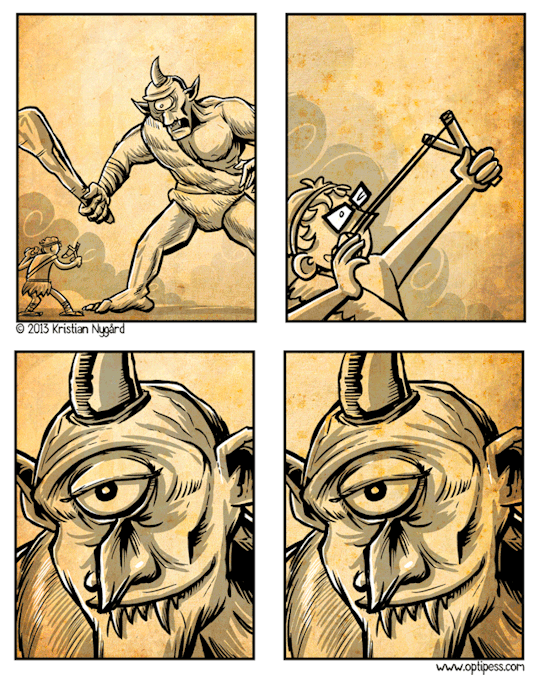
Elhanan, son of Jaare-Oregim the Bethlehemite (Hebrew: אֶלְחָנָן בֶּן־יַעְרֵי אֹרְגִים בֵּית הַלַּחְמִי ʾElḥānān ben-Yaʿrē ʾŌrəgīm Bēṯ halLaḥmī) is a character in 2 Samuel 21:19, where he is credited with killing Goliath:
"There was another battle with the Philistines at Gob, and Elhanan son of Jaare-oregim the Bethlehemite killed Goliath the Gittite, the shaft of whose spear was like a weaver's beam."[1]
In 1 Chronicles 20:5, he is called Elhanan son of Jair (אֶלְחָנָן בֶּן־יָעִיר ʾElḥānān ben-Yāʿīr), indicating that Jaare-oregim is a garbled corruption of the name Jair and the word for "beam" used in the verse (ʾōrəgīm). The passage in 2 Samuel 21:19 poses difficulties when compared with the story of David and Goliath in 1 Samuel 17, leading scholars to conclude "that the attribution of Goliath's slaying to David may not be original," but rather "an elaboration and reworking of" an earlier Elhanan story, "attributing the victory to the better-known David.

14 notes
·
View notes
Text

David and Goliath
1 The Philistines make war against Israel. 10 Goliath defieth Israel. 17 David is sent to his brethren. 34 The strength and boldness of David. 47 The Lord saveth not by sword nor spear. 50 David killeth Goliath, and the Philistines flee.
1 Now the Philistines gathered their armies to battle, and came together to Sochoh which is in Judah, and pitched between Sochoh and Azekah, in the coast of Dammim.
2 And Saul, and the men of Israel assembled and pitched in the valley of Elah, and put themselves in battle array to meet the Philistines.
3 And the Philistines stood on a mountain on the one side, and Israel stood on a mountain on the other side: so a valley was between them.
4 ¶ Then came a man between them both out of the tents of the Philistines, named Goliath of Gath: his height was six cubits and an hand breadth,
5 And had an helmet of brass upon his head, and a brigandine upon him: and the weight of his brigandine was five thousand shekels of brass.
6 And he had boots of brass upon his legs, and a shield of brass upon his shoulders.
7 And the shaft of his spear was like a weaver’s beam: and his spear head weighed six hundred shekels of iron: and one bearing a shield went before him.
8 And he stood, and cried against the host of Israel, and said unto them, Why are ye come to set your battle in array? am not I a Philistine, and you servants to Saul? choose you a man for you, and let him come down to me.
9 If he be able to fight with me, and kill me, then will we be your servants: but if I overcome him, and kill him, then shall ye be our servants, and serve us.
10 Also the Philistine said, I defy the host of Israel this day: give me a man, that we may fight together.
11 When Saul and all Israel heard those words of the Philistine, they were discouraged, and greatly afraid.
12 ¶ Now this David was the son of an Ephrathite of Bethlehem Judah, named Jesse, which had eight sons: and this man was taken for an old man in the days of Saul.
13 And the three eldest sons of Jesse went and followed Saul to the battle: and the names of his three sons that went to battle were Eliab the eldest, and the next Abinadab, and the third Shammah.
14 So David was the least: and the three eldest went after Saul.
15 David also went, but he returned from Saul to feed his father’s sheep in Bethlehem.
16 And the Philistine drew near in the morning, and evening, and continued forty days.
17 And Jesse said unto David his son, Take now for thy brethren an Ephah of this parched corn, and these ten cakes, and run to the host to thy brethren.
18 Also carry these ten fresh cheeses unto the captain, and look how thy brethren fare, and receive their pledge.
19 (Then Saul and they, and all the men of Israel were in the valley of Elah, fighting with the Philistines.)
20 ¶ So David rose up early in the morning, and left the sheep with a keeper, and took and went as Jesse had commanded him, and came within the compass of the host: and the host went out in array, and shouted in the battle.
21 For Israel and the Philistines had put themselves in array, army against army.
22 And David left the things which he bare, under the hands of the keeper of the carriage, and ran into the host, and came, and asked his brethren how they did.
23 And as he talked with them, behold, the man that was between the two armies, came up, (whose name was Goliath the Philistine of Gath) out of the army of the Philistines, and spake such words, and David heard them.
24 And all the men of Israel when they saw the man, ran away from him, and were sore afraid.
25 For every man of Israel said, Saw ye not this man that cometh up? even to revile Israel is he come up: and to him that killeth him, will the King give great riches, and will give him his daughter, yea, and make his father’s house free in Israel.
26 ¶ Then David spake to the men that stood with him, and said, What shall be done to the man that killeth this Philistine, and taketh away the shame from Israel? for who is this uncircumcised Philistine, that he should revile the host of the living God?
27 And the people answered him after this manner, saying, Thus shall it be done to the man that killeth him.
28 And Eliab his eldest brother heard when he spake unto the men, and Eliab was very angry with David, and said, Why camest thou down hither? and with whom hast thou left those few sheep in the wilderness? I know thy pride and the malice of thine heart, that thou art come down to see the battle.
29 Then David said, What have I now done? Is there not a cause?
30 And he departed from him into the presence of another, and spake of the same manner, and the people answered him according to the former words.
31 ¶ And they that heard the words which David spake, rehearsed them before Saul, which caused him to be brought.
32 So David said to Saul, Let no man’s heart fail him, because of him: thy servant will go, and fight with this Philistine.
33 And Saul said to David, Thou art not able to go against this Philistine to fight with him: for thou art a boy, and he is a man of war from his youth.
34 And David answered unto Saul, Thy servant kept his father’s sheep, and there came a lion, and likewise a bear, and took a sheep out of the flock,
35 And I went out after him and smote him, and took it out of his mouth: and when he arose against me, I caught him by the beard, and smote him, and slew him.
36 So thy servant slew both the lion, and the bear: therefore this uncircumcised Philistine shall be as one of them, seeing he hath railed on the host of the living God.
37 ¶ Moreover David said, The Lord that delivered me out of the paw of the lion, and out of the paw of the bear, he will deliver me out of the hand of this Philistine. Then Saul said unto David, Go, and the Lord be with thee.
38 And Saul put his raiment upon David, and put an helmet of brass upon his head, and put a brigandine upon him.
39 Then girded David his sword upon his raiment, and began to go: for he never proved it: and David said unto Saul, I can not go with these: for I am not accustomed. Wherefore David put them off him.
40 Then took he his staff in his hand, and chose him five smooth stones out of a brook, and put them in his shepherd’s bag or scrip, and his sling was in his hand, and he drew near to the Philistine.
41 ¶ And the Philistine came and drew near unto David, and the man that bare the shield went before him.
42 Now when the Philistine looked about and saw David, he disdained him: for he was but young, ruddy, and of a comely face.
43 And the Philistine said unto David, Am I a dog, that thou comest to me with staves? And the Philistine cursed David by his gods.
44 And the Philistine said to David, Come to me, and I will give thy flesh unto the fowls of the heaven, and to the beasts of the field.
45 ¶ Then said David to the Philistine, Thou comest to me with a sword, and with a spear, and with a shield, but I come to thee in the Name of the Lord of hosts, the God of the host of Israel, whom thou hast railed upon.
46 This day shall the Lord close thee in mine hand, and I shall smite thee, and take thine head from thee, and I will give the carcasses of the host of the Philistines this day unto the fowls of the heaven, and to the beasts of the earth, that all the world may know that Israel hath a God,
47 And that all this assembly may know, that the Lord saveth not with sword nor with spear, (for the battle is the Lord’s) and he will give you into our hands.
48 And when the Philistine arose to come and draw near unto David, David hasted and ran to fight against the Philistine.
49 And David put his hand in his bag, and took out a stone, and slang it, and smote the Philistine in his forehead, that the stone sticked in his forehead, and he fell groveling to the earth.
50 So David overcame the Philistine with a sling and with a stone, and smote the Philistine, and slew him, when David had no sword in his hand.
51 Then David ran, and stood upon the Philistine, and took his sword and drew it out of his sheath, and slew him, and cut off his head therewith. So when the Philistines saw that their champion was dead, they fled.
52 And the men of Israel and Judah arose, and shouted, and followed after the Philistines, until they came to the valley, and unto the gates of Ekron: and the Philistines fell down wounded by the way of Shaaraim, even to Gath and to Ekron.
53 And the children of Israel returned from pursuing the Philistines, and spoiled their tents.
54 And David took the head of the Philistine, and brought it to Jerusalem, and put his armor in his tent.
55 ¶ When Saul saw David go forth against the Philistine, he said unto Abner the captain of his host, Abner, whose son is this young man? and Abner answered, As thy soul liveth, O king, I cannot tell.
56 Then the King said, Inquire thou whose son this young man is.
57 And when David was returned from the slaughter of the Philistine, then Abner took him and brought him before Saul with the head of the Philistine in his hand.
58 And Saul said to him, Whose son art thou, thou young man? And David answered, I am the son of thy servant Jesse the Bethlehemite.
— 1 Samuel 17 | 1599 Geneva Bible (GNV)
Geneva Bible, 1599 Edition. Published by Tolle Lege Press. All rights reserved.
Cross References: Genesis 35:19; Genesis 37:13-14; Genesis 42:15; Numbers 13:31; Deuteronomy 5:26; Deuteronomy 20:1; Deuteronomy 28:26; Joshua 10:10; Joshua 11:22; Joshua 15:11; Joshua 15:16; Judges 18:21; 1 Samuel 7:7; 1 Samuel 8:17; 1 Samuel 14:6; 1 Samuel 14:12; 1 Samuel 16:6; 1 Samuel 16:11-12; 1 Samuel 16:19; 1 Samuel 18:4; 1 Samuel 18:17; 1 Samuel 19:5; 1 Samuel 20:6; 1 Samuel 21:9; 1 Samuel 25:18; 1 Samuel 26:5; 2 Samuel 2:12; 2 Samuel 21:19; 2 Samuel 21:21; 2 Samuel 23:21; Psalm 27:3; Jeremiah 46:4; Amos 3:12; Matthew 10:10; Matthew 10:36; 2 Corinthians 1:10; Hebrews 11:32-33; Revelation 19:17
#war#Israel#Philistines#Goliath#Goliath's challenge#Saul#David#faith#1 Samuel 17#Book of First Samuel#Old Testament#GNV#1599 Geneva Bible#Tolle Lege Press
7 notes
·
View notes
Text

POV: you (Vincenzo Foggini) accidentally use a gentile as the model for your group of Samson slaying the Philistines.
7 notes
·
View notes
Text
The people who believe most that our greatness and welfare are proved by our being very rich, and who most give their lives and thoughts to becoming rich, are just the very people whom we call Philistines.
Matthew Arnold, "Sweetness and Light," 1869.
16 notes
·
View notes
Text
Judges 15: Samson's Wife Is Given Away, Which Starts A War With The Philistines
1 Later on, at the time of wheat harvest, Samson took a young goat and went to visit his wife. He said, “I’m going to my wife’s room.” But her father would not let him go in.
2 “I was so sure you hated her,” he said, “that I gave her to your companion. Isn’t her younger sister more attractive? Take her instead.”
3 Samson said to them, “This time I have a right to get even with the Philistines; I will really harm them.”
4 So he went out and caught three hundred foxes and tied them tail to tail in pairs. He then fastened a torch to every pair of tails,
5 lit the torches and let the foxes loose in the standing grain of the Philistines. He burned up the shocks and standing grain, together with the vineyards and olive groves.
6 When the Philistines asked, “Who did this?” they were told, “Samson, the Timnite’s son-in-law, because his wife was given to his companion.”
So the Philistines went up and burned her and her father to death.
7 Samson said to them, “Since you’ve acted like this, I swear that I won’t stop until I get my revenge on you.”
8 He attacked them viciously and slaughtered many of them. Then he went down and stayed in a cave in the rock of Etam.
9 The Philistines went up and camped in Judah, spreading out near Lehi.
10 The people of Judah asked, “Why have you come to fight us?”
“We have come to take Samson prisoner,” they answered, “to do to him as he did to us.”
11 Then three thousand men from Judah went down to the cave in the rock of Etam and said to Samson, “Don’t you realize that the Philistines are rulers over us? What have you done to us?”
He answered, “I merely did to them what they did to me.”
12 They said to him, “We’ve come to tie you up and hand you over to the Philistines.”
Samson said, “Swear to me that you won’t kill me yourselves.”
13 “Agreed,” they answered. “We will only tie you up and hand you over to them. We will not kill you.” So they bound him with two new ropes and led him up from the rock.
14 As he approached Lehi, the Philistines came toward him shouting. The Spirit of the Lord came powerfully upon him. The ropes on his arms became like charred flax, and the bindings dropped from his hands.
15 Finding a fresh jawbone of a donkey, he grabbed it and struck down a thousand men.
16 Then Samson said,
“With a donkey’s jawbone
I have made donkeys of them.
With a donkey’s jawbone
I have killed a thousand men.”
17 When he finished speaking, he threw away the jawbone; and the place was called Ramath Lehi.
18 Because he was very thirsty, he cried out to the Lord, “You have given your servant this great victory. Must I now die of thirst and fall into the hands of the uncircumcised?”
19 Then God opened up the hollow place in Lehi, and water came out of it. When Samson drank, his strength returned and he revived. So the spring was called En Hakkore, and it is still there in Lehi.
20 Samson led Israel for twenty years in the days of the Philistines.
#Lord God Jehovah#Holy Bible#Judges ch.15#Israelites#Samson#Wife#Taken#Revenge#Foxes#Torches#Burned#Fields#Philistines#Killed#Father-In-Law#War#Attacked#Visciously#Slaughtered#Promised#Holy Spirit#Jawbone#Destroyed#Strucked#Donkey#Thousand#Men#Victory#Glory#Only Him
2 notes
·
View notes
Text
Deity Dagan
Originally a god of West Semitic speakers from the Levant, but worshipped widely throughout the Near East, including Mesopotamia.
Deity of grain, as well as its cultivation and storage. Indeed, the common word for "grain" in Ugaritic and Hebrew is dagan. According to one Sumerian tradition and to the much later Philo of Byblos, Dagan invented the plow. In the north, he was sometimes identified with Adad. Thus, he may have had some of the characteristics of a storm god. In one tradition his wife was Ishara, in another Salas, usually wife of Adad. Salas was originally a goddess of the Hurrians. Dagan also had netherworld connections. According to an Assyrian composition, he was a judge of the dead in the lower world, serving with Nergal and Misa-ru(m), the god of justice. A tradition going back at least to the fourth century BCE identified Dagan as a fish god, but it is almost certainly incorrect, presumably having been based upon a false etymology that interpreted the element "Dag" in Dagan as deriving from the Hebrew word dag "fish."
The earliest mentions of him come from texts that indicate that, in Early Dynastic times, Dagan was worshipped at Ebla. Dagan was taken into the Sumerian pantheon quite early as a minor god in the circle of Enlil at Nip-pur. Kings of the Old Akkadian peri-od, including Sargon and Narām-Sin, credited much of their success as conquerors to Dagan. Sargon recorded that he "prostrated (himself in prayer before Dagan in Tutul [sic]" (Oppen-heim, ANET: 268). At the same time, he gave to the god a large area of the country he had just conquered, including Mari, Ebla, and larmuti in western Syria. A number of letters from the Mari archives, dated mainly to the reign of Zimri-Lim, record that Dagãn was a source of divine revela-tion. The letters reported prophetic dreams, a number of which came from Dagan, conveyed by his prophets and ecstatics. In his law code, Hammu-rapi credits Dagan with helping him subdue settlements along the Euphrates.
The Assyrian king Samsi-Adad I commissioned a temple for him at Terqa, upstream from Mari, where funeral rites for the Mari Dynasty took place.
In the Old Babylonian period, kings of the Amorites erected temples for Dagan at Isin and Ur. In the Anzû(m) myth, Dagan was favorably coupled with Anu(m). At Ugarit Dagan was closely associated with, if not equated to, the supreme god El/I(u). Although he is mentioned in the mythic compositions of Ugarit as the father of the storm god Ba'lu/ Had(d)ad, Dagan plays only a very minor role. His popularity is indicated by his importance in offering and god lists, one of which places him third, after the two chief gods and before the active and powerful god Ba'lu/ Had(d)ad. Dagan is attested in Ugaritic theophoric names. In Ugaritic texts the god is often referred to as "Dagan of Tuttul." It might also be the case that one of the two major temples of the city of Ugarit was dedicated to him, and he might there have been identified with the chief god I(u) / El.
Festivals for Dagãn took place at Ter-ga and Tuttul, both of which were cult centers of the god. He was certainly worshipped at Ebla and also at Mari.
At Mari, in Old Babylonian times, he appears as fourth deity on a god list; that is, he was very important. He was venerated also at Emar. There a "Sacred Marriage" ritual between Dagan and the goddess Nin-kur was celebrated.
At the same city, a festival was held in honor of "Dagan-Lord-of-the-Cattle," at which the herds of cattle and prob. ably sheep were blessed.
According to the Hebrew Bible, Dagan was the national god of the Philistines. I Samuel:5-6 tells of the capture of the Ark of the Covenant by the Philistines. It was customary in the Ancient Near East for the conquerors to carry off the deity statues of the conquered to mark the surrender not only of the people, but also of their deities.
So the Philistines took the Ark, the symbol of the god of the Israelites, into the temple of Dagan at Ashdod. Since the Israelites had no statues of their deity, the much revered Ark was an obvious substitute. In this way, the Philistines marked the submission of the Israelite god to Dagan. However, on the next day, the people of Ashdod found the statue of Dagan lying face down in front of the Ark. The following day the same thing happened except that the head and hands of Dagan's statue lay broken on the temple threshold. This biblical account seems to be an etiology for a practice of the priests of the temple of Dagan at Ashdod, for it states that for this reason it is the custom of the priests of Dagan not to tread on the threshold as they enter the temple of Dagan. The best-known of the biblical stories that mention Dagan is in Judges 16, the tale of Samson and Delilah. After Delilah arranged for the Philistines of Gaza to capture Samson, they blinded him, shackled him, and made him a slave at a mill. During a festival to Dagan, the Philistines took Samson to be exhibited in Dagan's temple, where thou sands of Philistines had gathered for the celebrations. After praying to the Israelite god, the now long haired Samson got back his old strength. By pushing against two central pillars, he brought the temple crashing down on himself and on more Philistines than he had killed in his whole lifetime of killing Philistines.
— From a Handbook to Ancient Near Eastern Gods & Goddesses by Frayne & Stuckey page 67-69
#pagan#polytheism#levpag#philistines#israelites#canaanites#assyrians#1 samuel#tanakh#mesopotamians#dagan#dagan deity#deity#god#quote#sumerian polytheism#levant#ancient near east#landof2rivers#quote pile#put this in text for someone so thought id post it#eblaite#ebla
8 notes
·
View notes
Text
Listening to a 1920s, 30s and 40s playlist while I'm working (as has been my wont in recent months) and what song comes up?
My Heart Belongs to Daddy
8 notes
·
View notes
Text
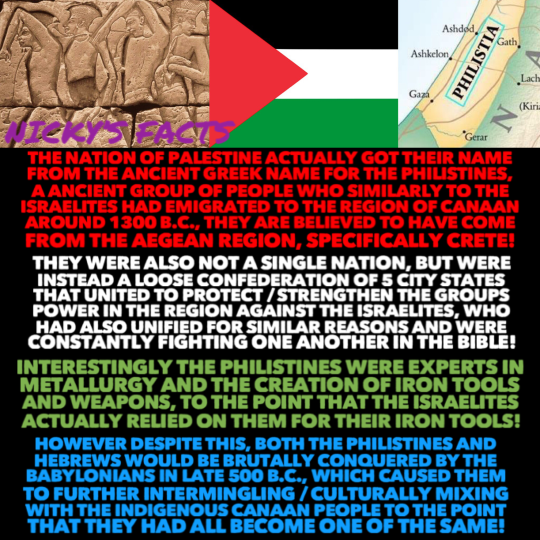
The Palestinians have existed since ancient times🏺
🇵🇸
#history#palestine#philistines#ancient#kingdom of israel#gaza#canaan#palestinian history#iron tools#metal work#bible#crete#aegean region#free palestine#ancient history#israelites#palestinian people#palestine will be free#middle east#ancient palestine#biblical times#gaza city#metallurgy#nickys facts
19 notes
·
View notes
Link

New Banner Feature : Ancient Canaan
Explore the cities, groups, states, and kingdoms which went into making up the ancient region of Canaan (today's Levant) in the Near East of the third, second, and first millennia BC.
#history#historyfiles#ancient history#near east#near east history#middle east#middle east history#ancient israel#ancient lebanon#phoenicia#phoenicians#city states#levant#kingdoms#king lists#semites#philistines
8 notes
·
View notes
Photo
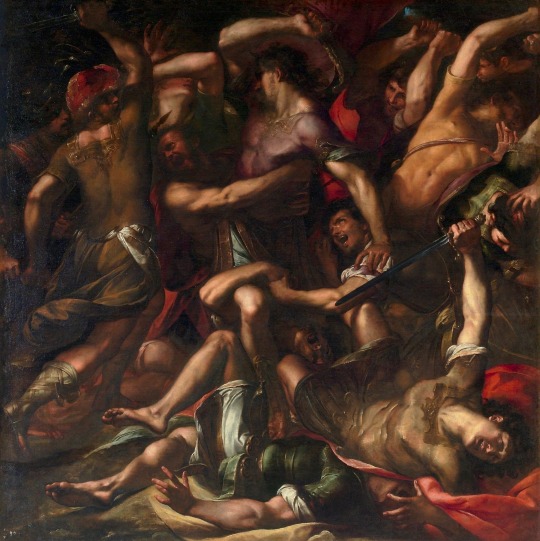
‘with the jawbone of an ass
I have slain a thousand men’
Samson’s killing spree begins with the slaughter of 30 Philistine men who were just bystanders to a stupid argument. He goes on to burn all of the grain, vineyards and olive groves of the Philistines. Armed with the jawbone of a donkey, Samson goes on to kill 1,000 more Philistines. The text in Judges 14 suggests that this deeply flawed character was a tool deployed by the god of the Israelites to provoke conflict with the Philistines.
Giulio Cesare Procaccini’s painting, made around 1625, is in the Prado Museum.
7 notes
·
View notes
Text
“At that moment an evidence was imposed on me that has never left me since then: the true Philistines are not a people incapable of recognizing beauty, because of course they recognize it and very well, they detect it instantly, and with such an infallible nose like that of the most subtle aesthete, but it is so that he can immediately fall on it in order to drown it before it can enter his universal empire of ugliness.
For ignorance, obscurantism, bad taste or stupidity are not the result of simple deficiencies, but of many other active forces, which furiously assert themselves at the slightest opportunity, and do not tolerate any exception to their tyranny.
Inspired talent is always an insult to mediocrity. The need to lower everything to our miserable level, to sully, mock and degrade everything that dominates us by its splendor is probably one of the most devastating features of human nature.
—Simon Leys, The Happiness of the Little Fishes.
#Simon Leys#ugliness#empire of ugliness#beauty#mediocrity#the age of the big drain#writers#essays#philistines#culture#garbage in garbage out#tyranny of ugliness
6 notes
·
View notes
Text
Sea Peoples' Invasions, Egypt, the Hittite Empire, its Achaean allies, Lukka/Peleset, the Trojan War, Homer's Intentional Falsehood, and the Modern European Forgery 'Ancient Greece'
Book review of the book 'Trojan Horse of Western History' by Anatoly V. Belyakov and Oleg A. Matveyshev
Contents
Introduction
I. The civilized Oriental World & the South Balkan periphery
II. The Hittite imperial order and the disorderly barbarians of Western Anatolia, South Balkans, Crete and the Anatolian Sea
III. The Sea Peoples' invasions as a determinant historical fact and the Trojan War as a worthless falsehood
IV. What is hidden behind the false term 'Achaean World'?
V. Without an in-depth comprehension of the Egyptian, Hittite Anatolian, Canaanite and Mesopotamian civilizations, no one can possibly understand their backward periphery
VI. Why Dio Chrysostom's historical sources are trustworthy and Homer's pretenses are proven red herring
VII. The absolute denigration of the Late Antiquity Greeks by the Ancient Egyptian high priest as the destination of Human History
VIII. Dio Chrysostom's Egyptian sacerdotal interlocutor had read Ramses III's Annals
IX. The fake term 'Ancient Greece' prevents us from assessing Homer's devastating failure
X. Conclusion
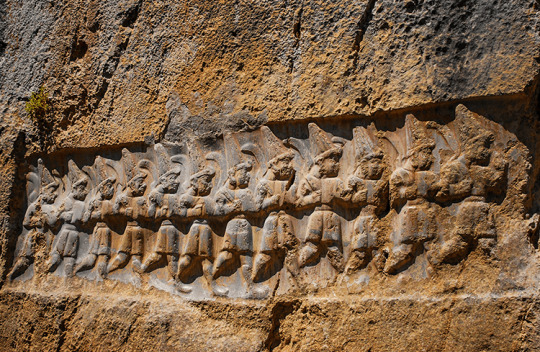
Introduction
What follows is an extensive discussion of the topics presented and the approaches employed in the aforementioned, passionately and impressively elaborated book (St. Petersburg: Piter, 2015 - 256 p.: pic / ISBN 978-5-496-01658-2) that I came to know through an astute Russian friend, shrewd thinker and avid reader.
Links to the Russian and English Wikipedia do not constitute an approval of the texts of the respective entries, but are offered for those among the non-specialized readers of my book review, who wish to launch their own search, starting with the references and the bibliography available of those entries.
Throughout the present article, I use the term 'Anatolian Sea', instead of 'Aegean Sea' which is certainly a historically valid appellation and form of reference. However, the latter term is academically inaccurate. This is so because throughout the last five millennia, we have attested that civilizations, forms of spirituality, religious faiths, cultural trends, ethnic migrations, cults, esoteric beliefs, intellectual movements, artistic and aesthetic tendencies spread from Anatolia to the sea in question, and thence to the South Balkans, and not vice versa. When it comes to Anatolian Sea, which is undeniably a semi-closed sea, we observe that, although various influences and diverse ethnic groups arrived there from the South (Libya), the Southeast (Egypt and Canaan/Phoenicia), and the North (Thrace, Macedonia and the central part of the Balkan Peninsula), the local evolution, historical creativity, and their main factors and aspects depended on Anatolia.
All these scattered islands constitute therefore the Anatolian archipelago and they consist in sheer projection and prolongation of the Anatolian civilization. This was particularly ostensible whenever both lands, Anatolia and South Balkans, belonged to the same empire. Within the Eastern Roman Empire and the Ottoman Caliphate, Anatolia constituted the epicenter and the South Balkans represented a marginal circumference. All the islands in-between depended on Anatolia and never formed an entity of their own.

Download the book review as text only or as text and 130 pictures & legends:
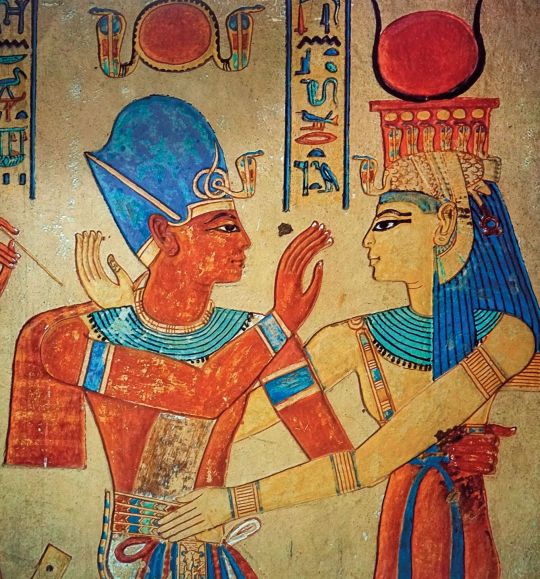


#Sea peoples#Sea peoples' invasions#Egypt#Hittite Empire#Hittites#Lukka#Peleset#Pelasgians#Philistines#Achaeans#Mycenaean#Minoan#Crete#Homer#Ancient Greek epics#Troy#Trojan War#Oleg A. Matveyshev
3 notes
·
View notes
Text

Word Against Philistia
1 That which came as the word of Yahweh to Jeremiah the prophet concerning the Philistines, before Pharaoh struck down Gaza. 2 Thus says Yahweh:
“Behold, waters are going to rise from the north
And become an overflowing torrent,
And overflow the land as well as its fullness,
The city and those who inhabit it;
And the men will cry out,
And every inhabitant of the land will wail.
3 Because of the noise of the galloping hoofs of his valiant steeds,
The quaking of his chariots, and the tumult of his wheels,
The fathers have not turned back for their children,
Because of the limpness of their hands,
4 On account of the day that is coming
To destroy all the Philistines,
To cut off from Tyre and Sidon
Every ally that is left;
For Yahweh is going to destroy the Philistines,
The remnant of the coastland of Caphtor.
5 Baldness has come upon Gaza;
Ashkelon has been ruined.
O remnant of their valley,
How long will you gash yourself?
6 Ah, sword of Yahweh,
How long will you not be quiet?
Withdraw into your sheath;
Be at rest and stay still.
7 How can it be quiet?
Yahweh has given it a command;
Against Ashkelon and against the seacoast—
There He has assigned it.”
— Jeremiah 47 | Legacy Standard Bible (LSB)
Legacy Standard Bible Copyright ©2021 by The Lockman Foundation. All rights reserved. Managed in partnership with Three Sixteen Publishing Inc.
Cross References: Genesis 10:14-15; Genesis 10:19; Deuteronomy 2:23; Judges 1:18; Judges 5:22; Judges 7:20; 1 Kings 4:24; Isaiah 8:7-8; Isaiah 10:6; Isaiah 14:29; Isaiah 14:31; Isaiah 23:1; Jeremiah 8:16; Jeremiah 12:12; Jeremiah 16:6; Jeremiah 25:20; Jeremiah 48:10; Jeremiah 50:35; Ezekiel 14:17; Ezekiel 21:30; Revelation 9:9; Revelation 17:15
#Word of God#judgment#Lord#Philistines#Jeremiah 47#Book of Jeremiah#Old Testament#LSB#Legacy Standard Bible#Three Sixteen Publishing Inc.#The Lockman Foundation
6 notes
·
View notes
Text
Jones - "Not my kind of music..." Barnaby - "Well, go wait in the car!" *you heathen*
(Jones in the car. *UNTS*UNTS*UNTS*UNTS*)
3 notes
·
View notes